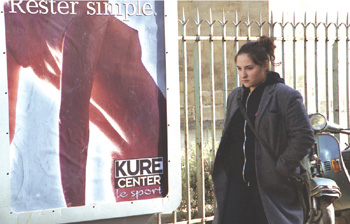![[Metroactive Movies]](/movies/gifs/movies468.gif)
[ Movies Index | Show Times | Silicon Valley | Metroactive Home | Archives ]

Photograph by Jean-Paul Dumas-Grillet/Corbie Paris Is Moping: Lolita (Marilou Berry) feels a bit intimidated by the average sophisticated Parisian in 'Look at Me.' Lo and Behold It's not easy being named Lolita, even if your father is a famous French writer IN THIS LIFE, said producer Samuel Goldwyn, you have to take the bitter with the sour. Nothing embitters the soul like artistic aspirations denied, and yet Agnés Jaoui's new film, Look At Me, ends with a lovely aria to the muses, "O Celestial Art." This moment of grace occurs after a movie's worth of acrid lampooning of la vie Bohéme in Paris today. The center of this wheel of ambition is Étienne (Jean-Pierre Bacri), a much-petted literary lion. This writer/publisher has just received the dividend of some movie money from an adaptation. The bad news is that, by all accounts, the movie version sucked. Still, Étienne enjoys the consolation of a trophy wife, Karine, played by the beautiful Virginie Desarnauts. The irritable Étienne also has a pair of new friends. One is the unsuccessful yet critically beloved writer Pierre (Laurent Grévill), a mope who feels he is at the end of his rope as a writer. That sentence was redundant—writers always feel like they're at the end of their rope. Pierre's wife, Sylvia (played by Jaoui), is a music teacher. She and Pierre got to meet Étienne through the least-loved member of his family: his daughter, Lolita (Marilou Berry). Étienne is the center of the film, but Lolita is the edge of this story's wheel, hopelessly spinning around her neurotic, immensely selfish dad. He ignores her, patronizes her and treats his furniture with more respect than his daughter. Lolita tried to be an actress and is now becoming a classical singer. Sylvia, who was at first impatient with Lolita's dime-a-dozen voice, only grew more interested when she found out just whose daughter Lolita was. Relief comes for Lolita when she meets a Franco-Arab student who calls himself Sébastien (Keine Bouhiza). It is usually reliable to expect that the Arab in a modern French movie will be the good guy, the underdog facing racism at its most subtle and snide. But Sébastien may also be just one more climbing writer. Jaoui is an ace at the machinery of dry farce, touching on such comic nuisances as country weekends, boneheaded TV chat shows and cell phones (here the little electronic pests whine like wasps or power drills). The superbly grouchy tone of Look at Me proves why French cinema must be protected. Any regular moviegoer can imagine the American way of handling this story: the fake epiphanies, the running jokes that would have slammed into a feel-good moment. (See The Upside of Anger for an example.) As tart as Jaoui's direction is, the best part of the movie is Berry's Lolita, the girl who has the most honest motives. It's easy to sympathize with her. Who doesn't feel fat and clumsy around Parisians? Berry seems to have two faces. When she sweeps her hair back, her neck is stout and her chin is thick, and she appears like a pink version of Shrek. But when her black hair is worn loose, she looks plumply, mysteriously sensual—a cousin of Mona Lisa. Her efforts to get the best of her dad make you laugh with her and at her at the same time.
Look At Me (PG-13; 110 min.), directed by Agn�s Jaoui, written by Jaoui and Jean-Pierre Bacri, photographed by Stéphane Fontaine and starring Bacri and Marilou Berry, opens Friday at select theaters.
Send a letter to the editor about this story to letters@metronews.com. [ Silicon Valley | Metroactive Home | Archives ]
|
From the April 6-12, 2005 issue of Metro, Silicon Valley's Weekly Newspaper.
Copyright © Metro Publishing Inc. Metroactive is affiliated with the Boulevards Network.
For more information about the San Jose/Silicon Valley area, visit sanjose.com.